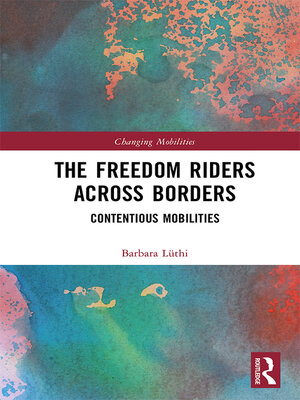The Freedom Riders Across Borders
ebook ∣ Contentious Mobilities · Changing Mobilities
By Barbara Lüthi

Sign up to save your library
With an OverDrive account, you can save your favorite libraries for at-a-glance information about availability. Find out more about OverDrive accounts.
Find this title in Libby, the library reading app by OverDrive.



Search for a digital library with this title
Title found at these libraries:
| Library Name | Distance |
|---|---|
| Loading... |
The Freedom Riders Across Borders: Contentious Mobilities provides the first comprehensive transnational historical analysis of the Freedom Rides. It explores the transnational history of these social movements and the struggles for the right to mobility and other civil rights in the United States of America, Australia, and Palestine between 1961 and 2011.
This book makes a significant contribution to the transnational studies of social movements and the burgeoning field of mobility studies by investigating the specific constellations of mobility as historically and geographically specific formations of movement as well as investigating how the images, ideas and strategies of Freedom Riders were adapted, translated, and moved across time and space. Foremost, this book speaks to the pressing questions of the past and present concerning the politics and inequalities of mobilities impacting different social groups in different ways. From a historical perspective, it gives answers to the intensified interest and questions concerning the dynamics, techniques and "contentious politics" of social movements in a globalized environment. The book details how the question of mobility has come to constitute political conflict and protest over norms, restrictions, and representations. It shows not only that mobility is a differentially accessed resource which shapes and is shaped by political processes, but also that contestation is an equal part of forming mobility. The book identifies vehicles as a mobile site of contestation and, in the context of the Freedom Rides, as a site of strategic political action.
In doing so, Lüthi makes a persuasive case for mobility to be given a central place in the study of progressive social movements. As such, this book will be of great interest to researchers in a number of disciplines, including history, geography and sociology.







